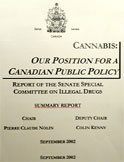
| Essential information for an informed debate about cannabis policy. |
 Senate Special Committee on Illegal Drugs,
Senate Special Committee on Illegal Drugs,
"Cannabis: Our Position for a Canadian Public Policy" (2002)
Full report online at: www.SenateReport.ca
Excerpt:
Conclusions and recommendations
The Senate Special Committee on Illegal Drugs’ mandate was to examine Canada’s public policy approach in relation to cannabis and assess its effectiveness and impact in light of the knowledge of the social and health-related effects of cannabis and the international context. Over the past two years, the Committee has heard from Canadian and foreign experts and reviewed an enormous amount of scientific research. The Committee has endeavoured to take the pulse of Canadian public opinion and attitudes and to consider the guiding principles that are likely to shape public policy on illegal drugs, particularly cannabis. Our report has attempted to provide an update on the state of knowledge and the key issues, and sets out a number of conclusions in each chapter.
This final section sets out the main conclusions drawn from all this information and presents the resulting recommendations derived from the thesis we have developed namely: in a free and democratic society, which recognizes fundamentally but not exclusively the rule of law as the source of normative rules and in which government must promote autonomy as far as possible and therefore make only sparing use of the instruments of constraint, public policy on psychoactive substances must be structured around guiding principles respecting the life, health, security and rights and freedoms of individuals, who, naturally and legitimately, seek their own well-being and development and can recognize the presence, difference and equality of others. [ Read the Summary report ]
 The Origins of Canada's Cannabis Laws - http://www.cfdp.ca/giffen.htm
The Origins of Canada's Cannabis Laws - http://www.cfdp.ca/giffen.htm
Excerpts from Giffen, Endicott and Lambert, Panic and Indifference: The Politics of Canada's Drug Laws (Canadian Centre on Substance Abuse, 1991)
Of particular interest:
* the addition of cannabis to the Schedule (of prohibited drugs) of the Opium and Narcotic Drug Act in 1923 before cannabis was identified as a social issue in Canada -- a "solution without a problem" (p. 179). The first seizure of marijuana cigarettes occurred only in 1932, nine years after the law had passed (p. 182); the first four possession offences (it is not clear whether these were charges or convictions) occurred only in 1937, 14 years after cannabis was criminalized (p. 599)
* the mystery about why cannabis was added to the Schedule of prohibited drugs in the first place, including the complete absence of debate in Parliament, and the lack of evidence of any consideration of the scientific knowledge about cannabis (pp. 179-80)
* the equally mysterious addition of "cannabis indica" to one of the carbon copies of a draft of the Schedule before it was enacted, with no explanation (p. 179)
* the hysterical, unscientific and racist rantings of Emily Murphy, Canada's first female magistrate (and one of the "Famous Five" who successfully argued that women were "persons" under Canadian law) that may have been the impetus for criminalizing cannabis (pp. 179-81)
* the apparent ignorance within government (even nine years after the law had passed) and the Canadian Medical Association that Canada had criminalized cannabis (pp. 181-82)
* very few possession offences -- in some years, none at all -- between 1923 and 1966; 1966 was the first year when cannabis possession offences (or charges) exceeded 100 per year (pp. 599-600)
* throughout these pages, reports of the wealth of propaganda by government, the police and the media about cannabis. Some things never change.
-- Eugene Oscapella, Canadian Foundation for Drug Policy, January 2003
 Marijuana Growth in British Columbia
Marijuana Growth in British Columbia
Date Published: June 1, 2004
The Fraser Institute (a Conservative "think-tank")
Author: Stephen T. Easton
Research Topic: Crime & Drug Policy
Download the report (PDF)
'The policies that we have in place just aren't effective in suppressing the activity,' says SFU economist Stephen Easton. 'It seems to me one reasonable alternative is that of legalization -- treat any social problems directly and openly, and then benefit from the revenue... generated by the marijuana industry.'
Related resources
